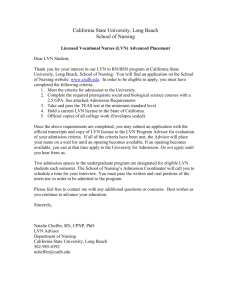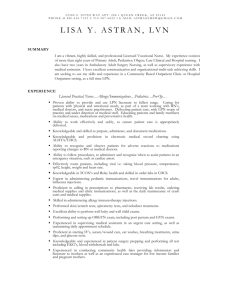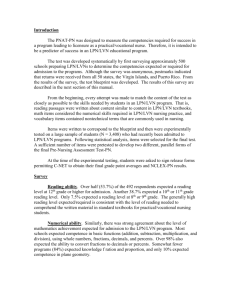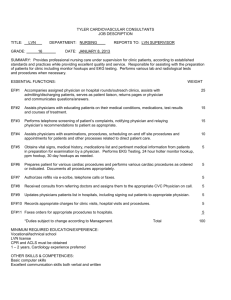Questions and Answers
advertisement
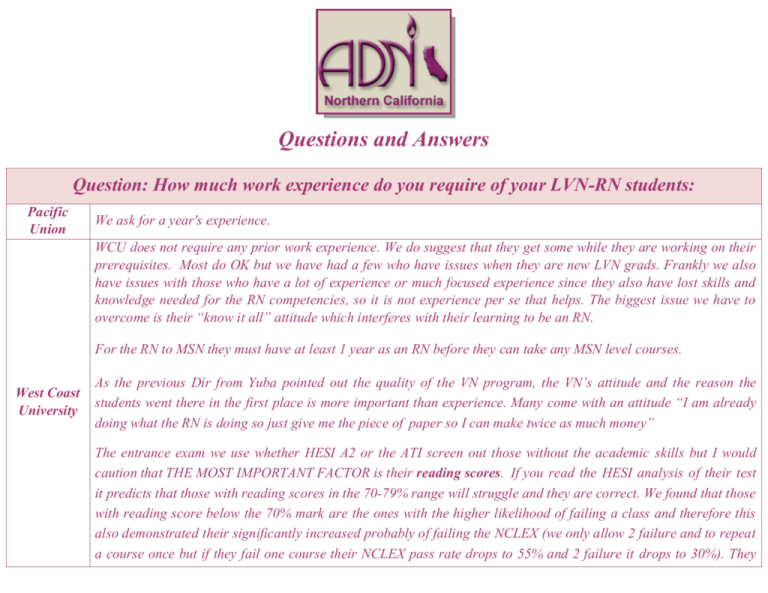
Questions and Answers Question: How much work experience do you require of your LVN-RN students: Pacific Union We ask for a year's experience. WCU does not require any prior work experience. We do suggest that they get some while they are working on their prerequisites. Most do OK but we have had a few who have issues when they are new LVN grads. Frankly we also have issues with those who have a lot of experience or much focused experience since they also have lost skills and knowledge needed for the RN competencies, so it is not experience per se that helps. The biggest issue we have to overcome is their ‚know it all‛ attitude which interferes with their learning to be an RN. For the RN to MSN they must have at least 1 year as an RN before they can take any MSN level courses. As the previous Dir from Yuba pointed out the quality of the VN program, the VN’s attitude and the reason the West Coast University students went there in the first place is more important than experience. Many come with an attitude ‚I am already doing what the RN is doing so just give me the piece of paper so I can make twice as much money‛ The entrance exam we use whether HESI A2 or the ATI screen out those without the academic skills but I would caution that THE MOST IMPORTANT FACTOR is their reading scores. If you read the HESI analysis of their test it predicts that those with reading scores in the 70-79% range will struggle and they are correct. We found that those with reading score below the 70% mark are the ones with the higher likelihood of failing a class and therefore this also demonstrated their significantly increased probably of failing the NCLEX (we only allow 2 failure and to repeat a course once but if they fail one course their NCLEX pass rate drops to 55% and 2 failure it drops to 30%). They have to pass with a minimum of a C all their gen ed courses before entering the nursing courses and they have to pass their Bridge course before moving on. Frankly we found they had the most trouble with their OB/Peds courses and then the med-surg critical care. We require them to take an integration course to prepare them for the NCLEX and despite passing all their previous courses struggle to pass the HESI exit exam. We also analyzed where they made mistakes and it was usually their fundamental questions that they missed. Very frustrating since we worked hard to not let that happen but it proves that they did not get it properly in their LVN program or forgot it all once they were employed. I even went back at one point to take the med surg test myself to see how I would do and I passed it with a very high score even through my specialty is OB and have not practice med surg in a long time. It makes you wonder what we need to do to insure they learn the basics“. We have a low attrition rate of between 8-12% throughout the entire (prerequisites and nursing courses) 18 month LVN-ADN program (which WCU no longer offers) because we also have a student success policy and catch them early when they start showing any type of problem – attendance, financial or academic or personal. Frankly it frequently is around their working too many hours and not taking their studying seriously despite us telling them to take 3 hours of study for every credit hour per week, i.e. 3:1 ratio. It often goes back to the attitude- ‚I already know all this‛ when they obviously do not. Many are also use to the factual questions which we do not use and they have problems with the NCLEX style application questions. WE also found their knowledge of medical terminology was very poor and this showed up in the HESI test analysis as well. They choose answers with easily understood English language answers. As soon as the choices require physiology knowledge of the words and application they could not consider that as a choice because they did not understand it- it was like a foreign language to them. Merced College We are using the merit-based system in our RN program, and we are holding the LVNs to the same admission criteria. We are not using work experience in the formula because we have found that most of our LVN's have been working in the clinic or MD offices--little preparation for going back in to the hospital setting and many of them have developed "bad" habits that need to be re-taught. We do have a bridge class before they begin the 3rd semester, and then an extra unit of clinical time in 3rd so that they "catch up" to the other students. In our bridge course, we do include content on "returning to school syndrome" that discusses culture shock, conflict and false acceptance (pretending to accept the changes in role but actually not seeing any differences). All of these don't necessarily deal with just LVN to RN, but going back for a BSN or MSN. We also have a section on role differentiation between the LVN and RN, what is perceived and what licensing or nurse practice act recognizes. When we offer the class in the Spring, we will be asking them to demonstrate their basic skills in order to complete the course. We actually had a LVN student in our 4th semester that refused to give NG meds because they didn't remember learning it in their LVN program. Unfortunately for us, we don't have the option of offering a separate cohort--as many as 5 are added to a class of 25 in the 3rd semester, but having the extra unit of clinical for the LVNs does help in that assimilation (they have 6 additional clinical days that is a 1:5 ratio with the instructor). What I personally enjoy about teaching the LVN to RN class is that I "lived" it. When I attended my LVN program here at Merced, they did not have a "generic" RN program available. I did not work long as a LVN (only 2 years) before finishing my RN degree, but I really didn't understand the different roles until I had completed the 3rd semester of the program. But I know that our LVNs could give us an earful on how hard it is to get up to speed again and adjust to being back and school while working (in many cases). We had a faculty meeting today and this was a big part of our discussion--our only 2 LVN to RN students in 3rd semester are the ONLY students who are not performing well in clinical. What is really interesting is that they graduated from our LVN program just last semester, so they did rotations in the same hospital, had the same basic expectations about med passes, AND actually completed one semester of our RN program before transferring to the LVN program--so they were familiar with paperwork. Of course the discussion quickly morphed in to whether some people are just not meant to be RNs, what type of exercises would help in this role transition. I also wonder if some of the LVN work experiences really don’t encourage them to "think" outside the skills performance--whether they lose that critical-thinking aspect of assessment data that can drive care. Sierra College At this point, I think that if we could create a survey that asks these students what were some of the challenges were coming back to school, what they perceived as the differences in roles, and whether they feel prepared to assume this role change. At Sierra LVN to RN students have to have a minimum of 6 months full-time experience within the last 2 years in acute care or skilled nursing to be admitted as advanced placement. We have found many challenges in LVN transition and are currently looking into strategies to better support transition. One of the greatest challenges that the bridge course does not teach is ‚how to be a student‛. Most of Chabot College our applicants have been out of school for many years and do not know how to approach the rigor of the curriculum, time management etc. We have found that there is also a need to ‚break old habits‛ and address preconceived notions about the differences in the scopes of practice. Based on experience with this student group, I am of the opinion that they need a separate cohort in place of bringing them in with the generic students. I would be interested in what you have found as well as I believe we can serve this population better. At Chabot College we require the LVN students to have at least one year of full time employment to be admitted as an Advance Standing Student. We do have difficulty in getting our LVN's to complete the program. I am interested in what you find. I would say about 5 out of 10 complete our program each year. I think it would really help if we had a dedicated faculty member or counselor to follow their progress Mendocino At Mendocino College we ‘highly recommend’ one year of recent acute care experience, but very few have this College experience since they are not working in that environment. We haven't had a bridge program or LVN to RN students for a while but I concur with your findings based on the few "experienced" LVNs that we had. The scope of practice is not really clear to them and it's hard to think like a nurse Ohlone let alone be a student after many years. The critical thinking or reasoning is missing, not to mention the fact that College most of them have problems with technology. Having a separate cohort may be a good idea. Then you can really focus on their needs.

